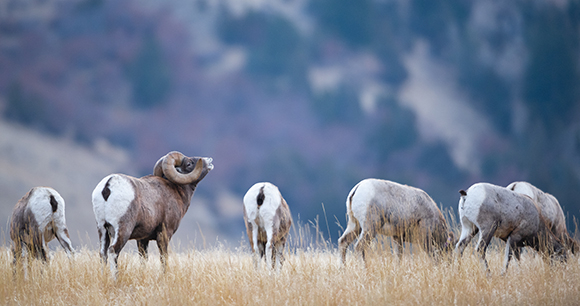
Washington, DC—The Animal Welfare Institute (AWI) announced today the eight recipients of its Christine Stevens Wildlife Award who are developing humane solutions to human-wildlife conflicts and less intrusive methods to study wildlife.
The award provides individual grants of up to $15,000 and is named in honor of AWI’s late founder and longtime president, who dedicated her life to reducing animal suffering both here and abroad. Stevens founded AWI in 1951 to end the cruel treatment of animals in experimental laboratories. Inevitably, her work expanded to take on other animal welfare causes, including protecting vulnerable species, reforming methods used to raise animals for food, banning steel-jaw leghold traps, ending commercial whaling, and much more.
Since the award program’s launch in 2006, AWI has contributed over $1.2 million to support nearly 120 research projects in North America. This year, AWI received over 40 applications that proposed new, less invasive methods to study wildlife and novel approaches to humanely remedy human-wildlife conflicts—from evaluating the impact of light pollution on pollinators to determining how livestock pathogens affect bighorn sheep.
“All too often, real or perceived threats to human safety or property have resulted in animals being ruthlessly eliminated,” said Susan Millward, AWI’s CEO and executive director. “Christine Stevens was an ardent champion of humane, nonlethal solutions to human-wildlife conflicts, and AWI continues to honor her legacy by supporting innovative research to find ‘win-win’ solutions, embrace coexistence, and prevent animal suffering.”
The 2025 Christine Stevens Wildlife Award grant recipients are:
- Nate Denke, University of Washington, to use noninvasive bioacoustics monitoring and trail signage (with input from local tribes) to examine the impact of recreation on sensitive birds in the Mt. Baker-Snoqualmie National Forest.
- Dr. Lorenzo Fiori, Texas A&M University–Corpus Christi, to deploy drones to assess the nutritional health of bottlenose dolphins foraging among shrimp trawlers in Corpus Christi Bay.
- Rushil Kukreja, Thomas Jefferson High School for Science and Technology, to test whether reducing nighttime light intensity in designated dark corridors in Virginia and Maryland enhances the activity of pollinators (e.g., honeybees, bumblebees) and plant reproductive rates.
- Dr. Maureen H. Murray, Lincoln Park Zoo, to evaluate the use of contraceptive food pellets as a nonlethal strategy to humanely reduce urban rat populations in the Chicago area.
- Dr. Nico(la) Ransome, National Whale Museum of Mexico/Murdoch University, to use passive acoustic monitoring, photo-identification, and noninvasive DNA collection to investigate the presence of beaked whales in the Islas Marias UNESCO Biosphere Reserve in Mexico.
- Dr. Ronnie Serfa Juan, US Department of Agriculture-Agricultural Research Service and Kansas State University, to develop AI-driven, nonlethal deterrence techniques to protect birds, including Canada geese, great blue herons, and egrets, while reducing their impact on aquaculture operations.
- Dr. Logan Thomas, Kansas State University, to use camera-monitored hair snares to noninvasively collect samples from javelina to determine how they cope physiologically with human-wildlife conflicts and seasonal environmental stressors in South Texas.
- Jasmine Veitch, University of Calgary, to use genetic analysis of fecal samples from Rocky Mountain bighorn sheep to examine microbial transmission and pathogenic potential of livestock interactions.
Click here for more information about the Christine Stevens Wildlife Award and the 2025 recipients.
Marjorie Fishman, Animal Welfare Institute
[email protected], (202) 446-2128
The Animal Welfare Institute (awionline.org) is a nonprofit charitable organization founded in 1951 and dedicated to alleviating animal suffering caused by people. We seek to improve the welfare of animals everywhere: in agriculture, in commerce, in our homes and communities, in research, and in the wild. Follow us on Facebook, Instagram, Threads, Bluesky, and LinkedIn for updates and other important animal protection news.